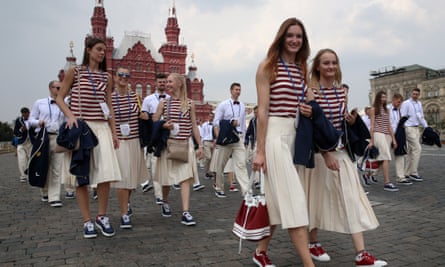Where is the justice in this? The Russian athlete, Yuliya Stepanova, risks death by revealing the extent of Russian doping in her Olympic sport. She has to flee her country with her family, live in hiding and train in secret. She is told that, provided she is “clean”, she may compete in the Rio Olympics next week, but “as a neutral”. She is then told she cannot compete. Instead the International Olympic Committee offers her a free ticket to the Games, so she can eat her heart out watching her compatriots perform in front of her. It is the Snowden moral: any whistleblower against any sort of power will be ostracised and humiliated.
Last November, Russia’s drug abuse in sport was confirmed, in part on Stepanova’s evidence, by the first truly independent inquiry into its doping record by the Canada-led World Anti-Doping Agency. It castigated the Russians and demanded that the IOC exclude them from the Rio Olympics. The agency strangely seemed to exonerate just about everyone else, including the widely suspected Kenyans.
At the time I suggested that the IOC would never ban Russia. It was too powerful, a country rich enough to bribe international sporting bodies and, more importantly, rich enough to stage modern Olympics without budgetary restraint. The IOC had known for years of doping by certain states, but always turned a blind eye.
Last week the IOC did just that. It rejected the anti-doping agency’s demand, suggesting that individual sports decide for themselves whether Russia should compete. As if aware of its own culpability, it passed the buck. The IOC president, Thomas Bach, is said to be a good friend of Russia.
This is ludicrous. After the Ben Johnson drugs fiasco at Seoul in 1988, everyone was accusing everyone of doping. The IOC promised to rid sport of drugs “once and for all”. Any sports journalist I knew roared with laughter. In among the pain-killers, sleep-enhancers, muscle-bulkers and blood fresheners, there is legal stuff and illegal stuff. But every little helps. As a coach once told me: “You can get to the top clean, but to stay on top you take drugs.”
The IOC, like football’s Fifa, has become a master at marrying money to the craving of national leaders for prestige. Its apparat is awash in kickbacks to itself and profit to its cosy cartel of contractors. The modern Olympics are one thing the world borrowed from Hitler. In 1936 he “nationalised” what had been a world athletics competition and turned it into a global contest of who was top nation.
Anyone who has read two recent books on the Olympics - David Goldblatt’s The Games and Andrew Zimbalist’s Circus Maximus – will understand both Russia’s behaviour and the IOC’s appeasement of it. The pressure for results at any expense becomes hysterical, even in sports of minimal public appeal.

In Britain the BBC behaves like a cheerleader for a banana republic, sending to Rio more staff than the nation’s entire Olympic team. Young athletes are pawns, mercenaries to Orwell’s “war without guns”, for the greater glory of their country. In London in 2012, money was squandered, traffic lights halted, laws changed. David Cameron honoured medal winners, but punished the unsuccessful swimmers by starving them of cash.
I am sure drugs make a marginal difference to an athlete’s results. But with one country lavishing training facilities, equipment, nutritionists and research on its athletes, and another promoting oxygen absorption by chemicals, I wonder at the true difference. The gap between the “fastest man on earth” and a cheat is as likely to be money and semantics.
As long as world sport is about politics and money, people will cheat. They will bribe the IOC, Fifa and others to ignore or condone corruption. And there are plenty of gullible hangers-on to sanitise their image. Britain’s Lord Coe, for eight years vice-president of the IAAF (based, guess where, in Monaco), claims doping and corruption in athletics were the result of press hostility. He has sat on one “ethics committee” after another, while dripping in conflicts of commercial interest. Last year he was promoted to IAAF president and member of the IOC. It beggars belief.
The reality is that countries will promise to “spend what it takes” to host these festivals of chauvinist vanity. They will bankrupt cities, evict the poor, build white elephants and lie about legacies. I was in Rio to see preparations for the World Cup and the Olympics last summer. It was heartbreaking. The city was desperately poor, and Fifa and IOC officials were swanning around, frowning at slums and sniffing drains. Brazil should get its act together, they ordered, or they would shame it worldwide. The city duly faces bankruptcy.
The IOC, Fifa and the rest are immune to criticism or accountability – other than in the international press. They are tax-free cartels, floating on a cloud of hyperbole and corporate sponsorship. They have tapped the soft underbelly of nations, the desire of their leaders, dictators and democrats alike, to strut the world stage. All Russia has done is call the IOC’s bluff. It has called the IOC a hypocrite, and the IOC knows it is right.
Olympic Games should be where individuals come to run, jump, swim and compete. They should be denationalised, with teams, flags, anthems and state identities banned, and victory going to the best person, not the best state. Such games would attract little glamour or public money but it would be a more honest Olympics for true lovers of sports. The IOC could then hold its drug-assisted festivals of chauvinism for what are de facto government employees.
There is no sporting reason for denying Stepanova a place in the Rio 800m. The IOC specifically left the decision on her to the IAAF, which allowed her to compete. Only then did the IOC ban her, largely for show. If I were Stepanova I would sue.
If I were Moscow and really wanted to cause trouble, I would blow the whistle on all its past doping and bribery antics. I would confess all, with dates, names and invoices, and bring the whole rotten edifice crashing down. That would be truly Olympian.

